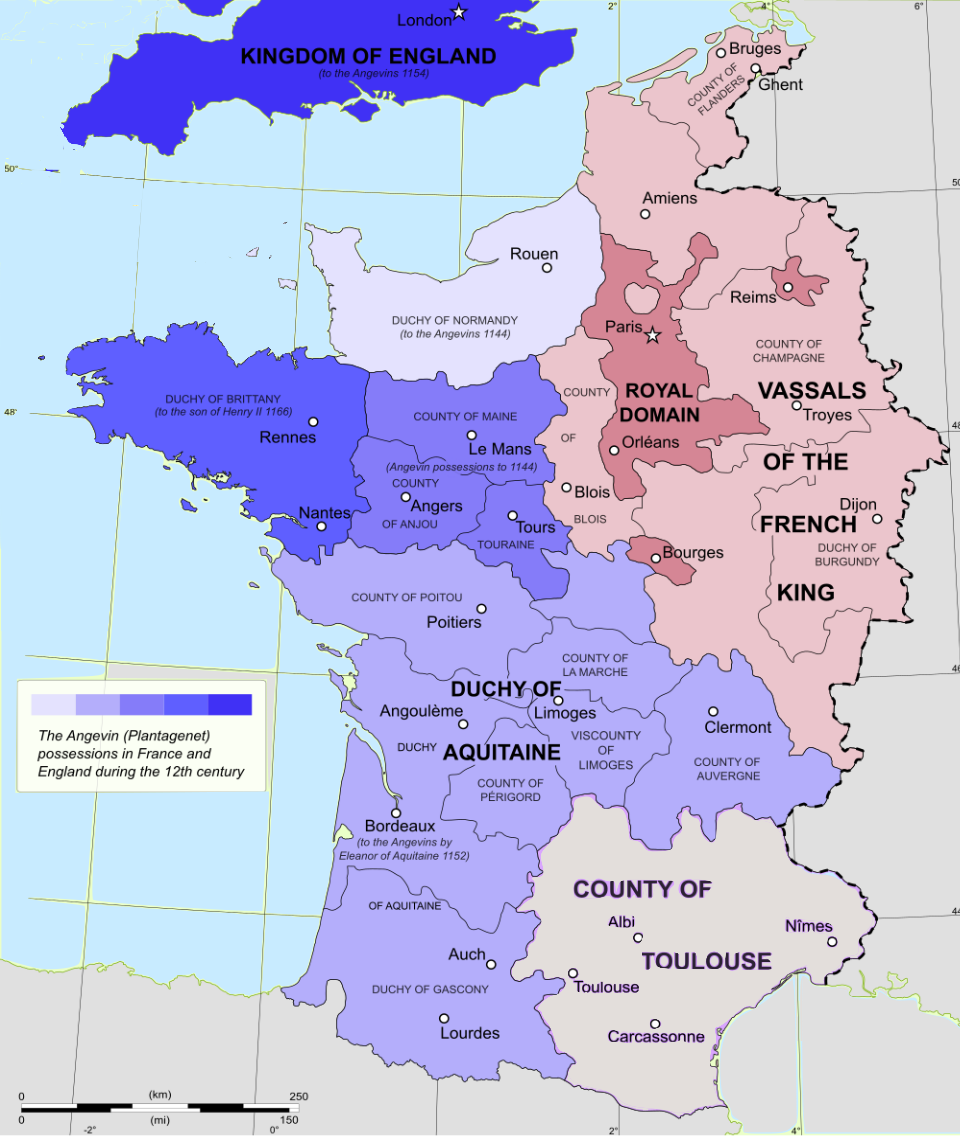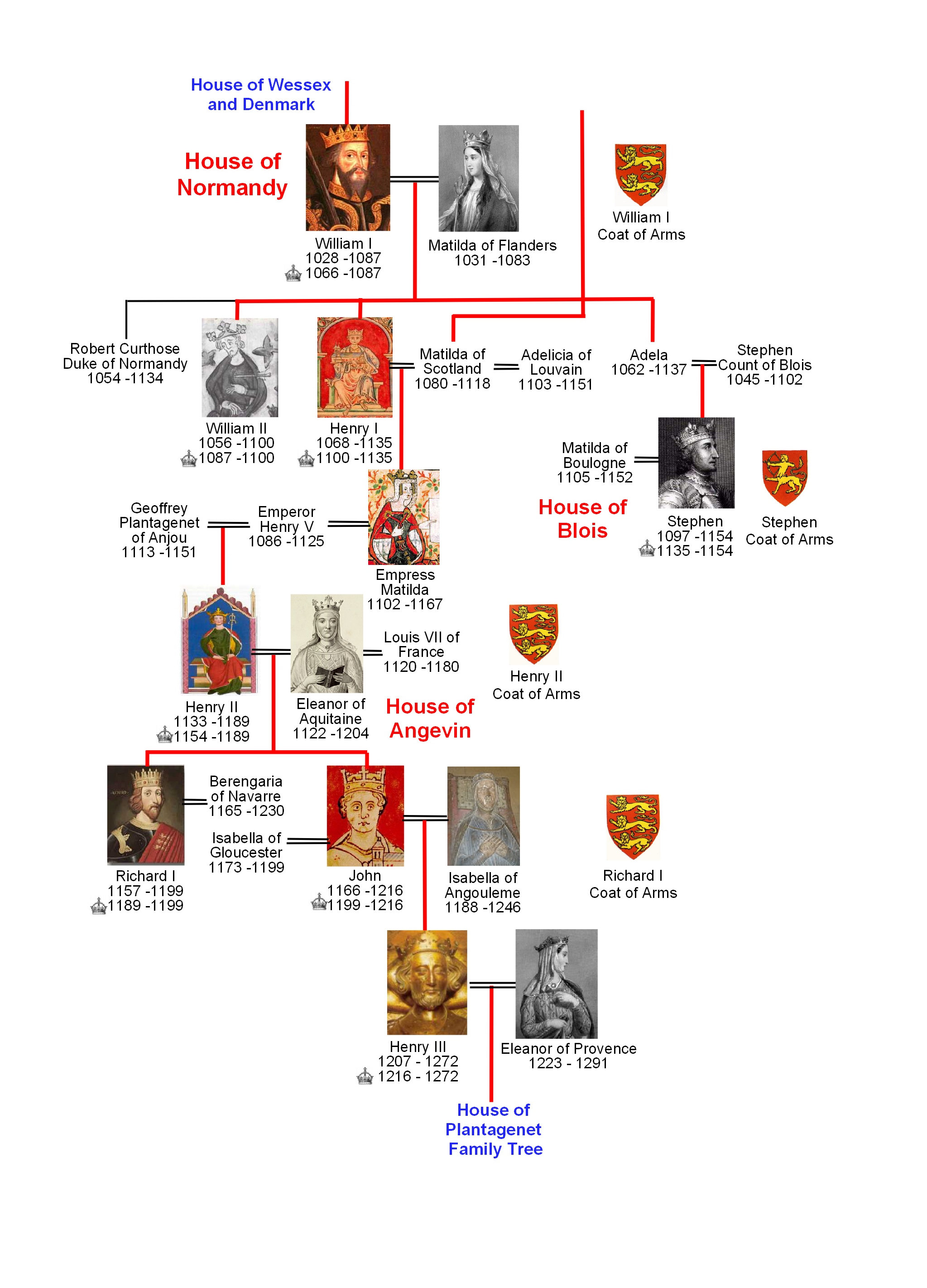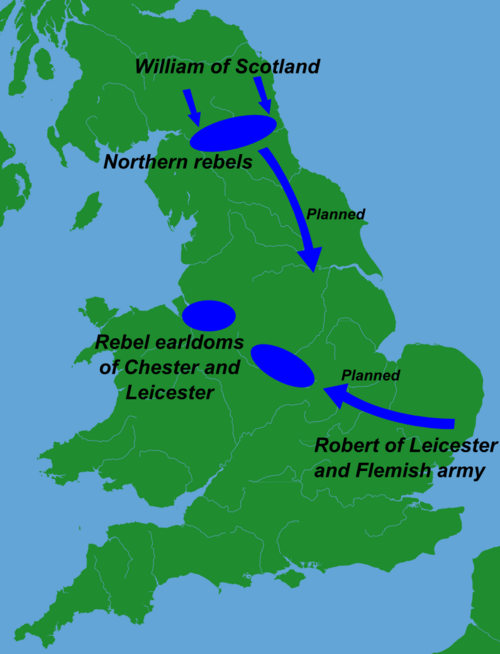IB Syllabus focus:
'The familial and geopolitical backdrop of Richard’s early life, including the dynamics of his family and the Angevin Empire.
The events, motivations, and outcomes of the revolt against Henry II, with a focus on Richard’s role and the implications for his subsequent ascent to the throne.
The challenges he faced in securing his power, both from within his family and from external enemies.'
The period leading up to Richard I's ascendancy as King of England was marked by turbulent familial relations, multifaceted political intrigues, and significant geopolitical shifts. To truly comprehend Richard's rise to power, it's imperative to explore his early life backdrop, the events leading to his eventual kingship, and the challenges he confronted on this journey.
Familial and Geopolitical Backdrop
The Angevin Empire
Origins: The Angevin Empire emerged from the union of territories across England and Western France, largely attributed to the matrimonial alliances and conquests of the Plantagenet family. This vast expanse of land spanned from the Scottish borders to the Pyrenees.

Simplified map of Plantagenet possessions in France around 1154, including Normandy, Anjou, and Aquitaine, the regions that formed Richard’s principal power base before his accession. The layout underscores the fragmented, feudal patchwork that demanded constant military and diplomatic management. Source
Complexity: Governed by a patchwork of feudal laws, the empire was less a centralised state and more a loose collection of territories held together by the Plantagenet monarchs.
Strategic Importance: Controlling such a wide array of territories meant that the Angevin rulers were constantly at the epicentre of European politics, leading to frequent alliances and conflicts with neighbouring states.
Dynamics of Richard's Family
Henry II: Richard's father was not only the mind behind the Angevin Empire's expansion but also a ruler who played a pivotal role in establishing common law traditions in England. His marriage to Eleanor of Aquitaine further expanded the empire's reach.
Siblings: The familial environment was one of intense competition. While Richard was the third son, his brothers Henry the Young King, Geoffrey, and John were all embroiled in plots and revolts, driven by desires for more autonomy and power.

Concise genealogical diagram of the Angevin royal family highlighting Henry II, Eleanor of Aquitaine, and their children, including Henry the Young King, Richard, Geoffrey, and John. This visualization helps explain the intra-dynastic rivalries that shaped Richard’s rise. Note: the full tree also shows daughters and later descendants beyond the immediate syllabus focus. Source
Revolt against Henry II
Events and Motivations
Growing Dissatisfaction: Henry II's style of governance, where he bequeathed titles and lands to his sons without granting genuine authority, was a major source of friction. This superficial distribution of power left the princes dependent and restless.
Eleanor's Influence: The queen, feeling alienated and imprisoned by Henry II due to previous disagreements, played an instrumental role in fanning the flames of rebellion among her sons.
The Great Revolt: Initiated in 1173, this rebellion saw Richard and his brothers forge alliances with notable counts and kings, including the King of France, to challenge Henry II's authority.

Overview map of the 1173–74 rebellion in England, indicating key rebel zones, royalist strongholds, and campaign movements against Henry II. It helps locate the revolt’s principal fronts and why coordinated royal responses proved decisive by 1174. Source
Richard's Role and Implications
Strategic Acumen: Richard's territories in Aquitaine became the fulcrum of many revolt activities. He showcased significant military talent, proving himself as a serious threat to his father's forces.
Outcomes of the Revolt: By 1174, the rebellion was quashed. Yet, the consequences of this revolt were profound. Richard's martial abilities came to the fore, setting the stage for his future endeavours. Despite facing punitive measures, he managed to retain his territories and status.
A Path Carved: With the deaths of his older brothers, Richard emerged as the prominent heir to the throne. The revolt, his sustained ambition, and the political landscape all steered him closer to kingship.
Challenges in Securing Power
Internal Family Threats
John's Ambitions: John, Richard's younger sibling, was notorious for his shifting allegiances. His recurrent efforts to undermine Richard, even forging alliances with French royalty, were a significant concern.
Eleanor's Power: Post-revolt, Eleanor's relationship with Richard evolved. While she was a key ally, her immense influence, especially in Aquitaine, meant Richard had to tread cautiously, ensuring her interests were respected.
External Threats
French Monarchy: French rulers, particularly Philip II, were longstanding adversaries. The Angevin territories in France were frequently targeted, instigating numerous conflicts and demanding Richard's persistent attention.
Local Nobility: As Duke of Aquitaine, Richard's rule wasn't universally accepted. He faced several rebellions from the local nobles. Addressing these revolts required a mix of diplomacy, strategic marriages, and, when necessary, military interventions.
Neighbouring Territories: Apart from the French crown, other neighbouring territories, envious of the Angevin Empire's expanse, occasionally posed threats, necessitating diplomatic manoeuvres and military campaigns.
In examining Richard I's rise to power, it becomes clear that his journey wasn't merely about personal ambition. It was a product of his era, moulded by intense geopolitical strategies, familial machinations, and his undeniable prowess, both as a leader and a warrior.
FAQ
Yes, Richard exhibited several indications of his leadership qualities even before the Great Revolt. As the Duke of Aquitaine from a young age, he was responsible for maintaining order and overseeing the administration of this vast territory. His early encounters with local rebellions and disputes showcased his adeptness at both military and diplomatic resolutions. Additionally, his interactions with the local nobility and vassals allowed him to hone his political acumen. These early experiences, combined with the guidance he received from his mother, Eleanor of Aquitaine, laid the groundwork for the leadership skills he would later display prominently during and after the Great Revolt.
Following the Great Revolt, the relationship between Richard and his mother, Eleanor of Aquitaine, evolved considerably. Eleanor, originally a catalyst for her sons' rebellion against Henry II, became a close ally and confidante to Richard. With her vast experience and influence, especially in the territories of Aquitaine, Eleanor proved invaluable to Richard's rule. They collaborated on numerous political and administrative matters. It is worth noting that, during Richard's participation in the Third Crusade, Eleanor played a pivotal role in governing his territories. This collaboration highlighted not only their strengthened bond but also Eleanor's continued significance in the Angevin Empire's affairs.
The territories of the Angevin Empire, sprawling across both England and vast regions of France, added layers of complexity to Richard's political decisions. These territories weren't homogenous; each had its unique set of laws, cultures, and challenges. As the Duke of Aquitaine, Richard had firsthand experience dealing with local revolts and noble disputes. Moreover, the constant threat from neighbouring French territories, especially under King Philip II, necessitated a nuanced approach, balancing between military aggression and diplomatic negotiations. These territories, while providing resources and influence, also demanded shrewd political manoeuvring to maintain cohesion and defend against external threats.
Richard's relationship with his brothers, particularly Henry the Young King and Geoffrey, was marked by competition, alliances, and occasional confrontations. They often found themselves pitted against each other due to the complex power dynamics established by their father, Henry II. The collaborative yet competitive nature of their interactions, most notably during the Great Revolt against their father, provided Richard with valuable experiences in alliance-building and military strategy. The untimely deaths of both Henry the Young King and Geoffrey cleared the path for Richard's ascendancy. While the brothers were rivals, their combined efforts during revolts and shared experiences undeniably shaped Richard's formative years.
Richard's early interactions with the French monarchy, particularly during the Great Revolt when he allied with King Louis VII of France against his own father, deeply influenced his perspective and strategies during his later reign. Recognising the French as formidable adversaries, Richard understood the importance of either maintaining diplomatic ties or ensuring military preparedness. His early alliances, both forged and broken, with the French crown gave him insights into their motivations and tactics. As King of England, this understanding was crucial. Richard's tenure saw repeated conflicts with King Philip II of France, and their shared history, coupled with Richard's early experiences, played a pivotal role in shaping these engagements.
Practice Questions
The familial dynamics played a crucial role in Richard I's early life and his eventual rise to power. His father, Henry II, expanded the Angevin Empire's territories, but it was his method of allocating titles without real authority to his sons that sowed seeds of discontent. Richard's participation in the Great Revolt, instigated partly due to these tensions, marked his emergence as a formidable military strategist. Furthermore, the demise of his elder siblings positioned him as the primary heir. Thus, while external geopolitical challenges were rife, it was the internal familial politics that proved pivotal in shaping Richard's path to kingship.
The Great Revolt was instrumental in showcasing Richard I's capabilities. Militarily, his active participation and use of Aquitaine as a strategic base demonstrated his tactical prowess. Despite the rebellion's failure, Richard's resilience and skills on the battlefield reinforced his image as a formidable warrior. Politically, the revolt highlighted his ability to forge alliances, as he collaborated with key figures, including the King of France. Moreover, his retention of territories post-revolt, despite facing punitive measures, signalled his astute political manoeuvring. Hence, the Great Revolt, though unsuccessful, significantly bolstered Richard's reputation in martial and political spheres.

